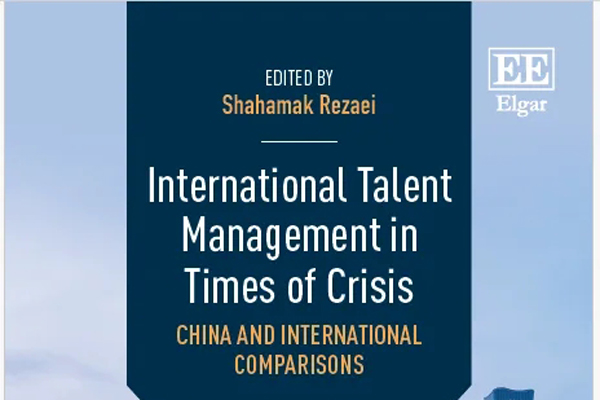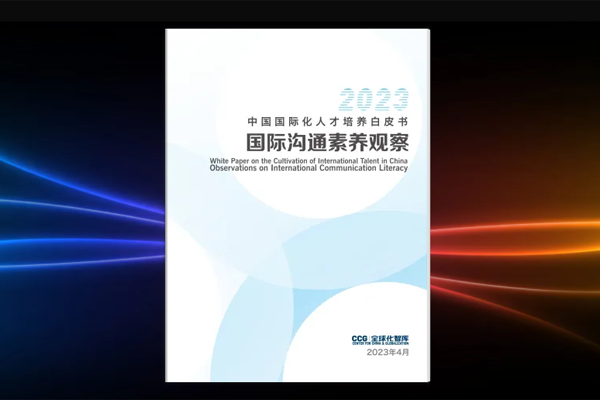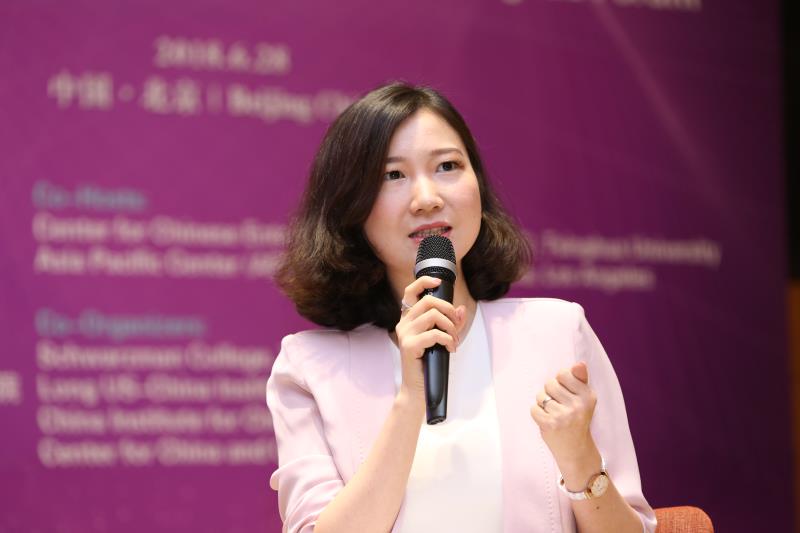CCG’s “China Talent 50” Roundtable Forum Focuses on Grand Strategy for Talent Development
January 19 , 2021
A hundreds scholars and experts in talent study, government officials, and business executives gathered at the Beijing International Hotel to attend the “China Talent 50” Roundtable Forum. The event, co-sponsored by the Center for China & Globalization and the Institute of Development Studies at the Southwest University of Finance and Economics, discussed how to address the opportunities and challenges of implementing the 13th Five-Year plan and accelerate the establishment of internationally competitive talent development system in China.
In the proposed 13th Five-Year Plan, the Central Committee of the Communist Party of China has highlighted the need to push forward talent development reform and policy innovation, with the aim of establishing an internationally competitive talent cultivation system. Echoing this call, “China Talent 50” Roundtable Forum was held to collect the thoughts and ideas of senior scholars and experts on how to effectively achieve the 13th Five Year Plan’s talent development goals.
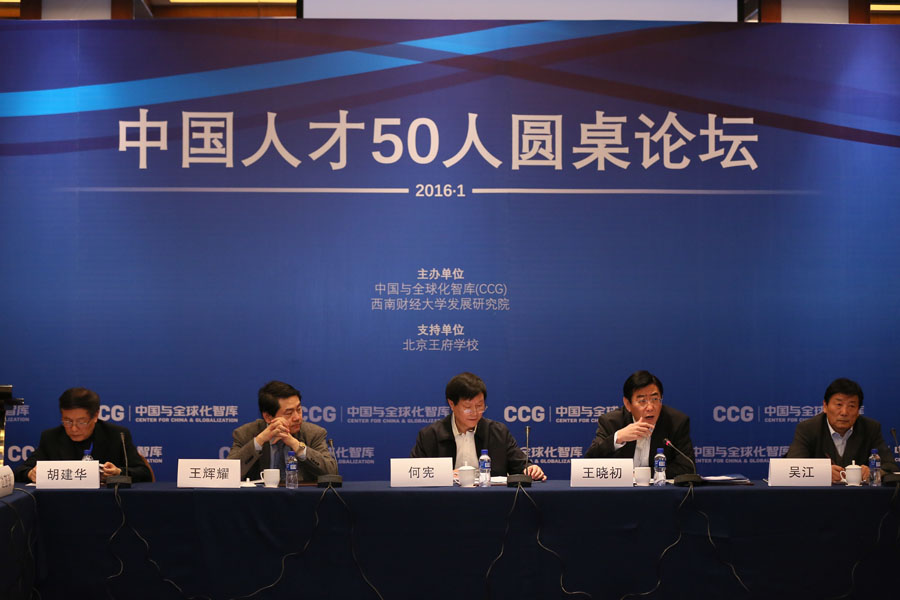
He Xian, former Minister of Human Resources and Social Security and President of China Talent Research Institute, and Wang Xiaochu, former Vice Minister of Human Resources and Social Security and Vice-Chairman of the Foreign Affairs Committee of the National People’s Congress, spoke at the forum, hosted by CCG President and State Councilor Wang Huiyao.
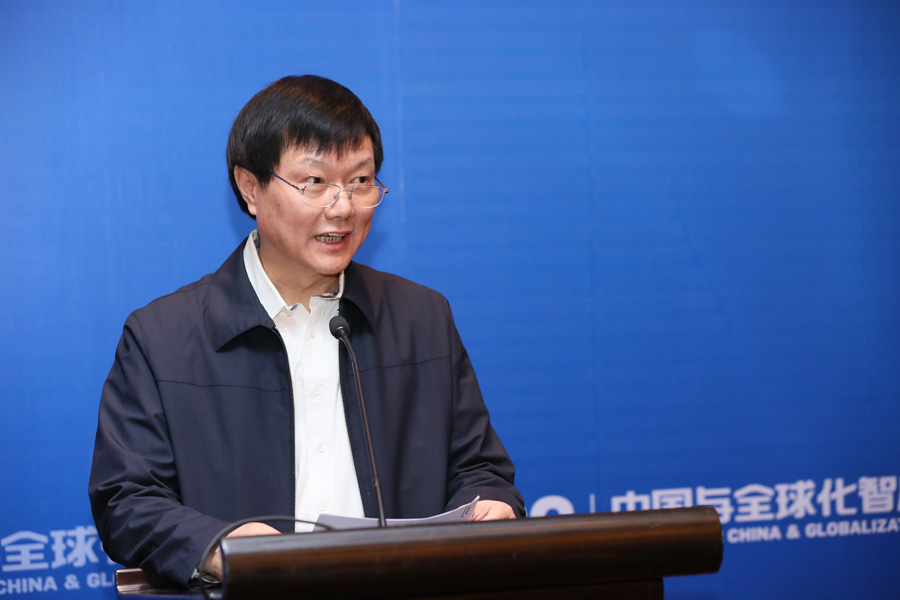
He Xian, former Minister of Human Resources and Social Security and President of China Talent Research Institute
He Xian, former Minister of Human Resources and Social Security and President of China Talent Research Institute, reviewed the process in which the strategy of reinvigorating China through talent development has evolved and been enriched. He emphasized the need to guide talent development work with new concepts and improve talent development strategy in accordance with the fundamental consideration and major targets of the 13th Five-Year plan. He encouraged those attending the forum to propose more valuable and constructive ideas that can contribute to the talent development strategy.

Wang Xiaochu, former Vice Minister of Human Resources and Social Security and Vice-Chairman of the Foreign Affairs Committee of the National People’s Congress
Wang Xiaochu, former Vice Minister of Human Resources and Social Security and Vice-Chairman of the Foreign Affairs Committee of the National People’s Congress, pointed out that many issues connected to talent development still need further study. Four are especially deserving of more attention: 1) how talent development work should be adjusted to the economic new normal; 2) how to further deepen talent development system reform with focus on boosting innovation of the people with various talent; 3) how to strengthen legislation for talent development; and 4) how to establish theoretical system to cultivate talent with Chinese characteristics.
According to CCG President Wang Huiyao, “China Talent 50” Roundtable Forum is a platform built in response to the Chinese government’s call to devise a talent development strategy and will provide opportunities for senior scholars and experts to talent study to exchange their ideas about talent development system reform and innovation. One of its features is to bridge the gap between academic researchers, on the one hand, and policy makers and business executives, on the other, by bringing them together in a single forum to exchange ideas and insights.
This forum had four sessions with the following themes: “The 13th Five-Year plan and Implementation of Strategy with Talent Development as a Priority”; “Accelerate Talent Development System Reform and Policy Innovation”; “”How to Establish Internationally Competitive Talent System”; and “Attract Talent to Promote Mass Entrepreneurship and Innovation.”
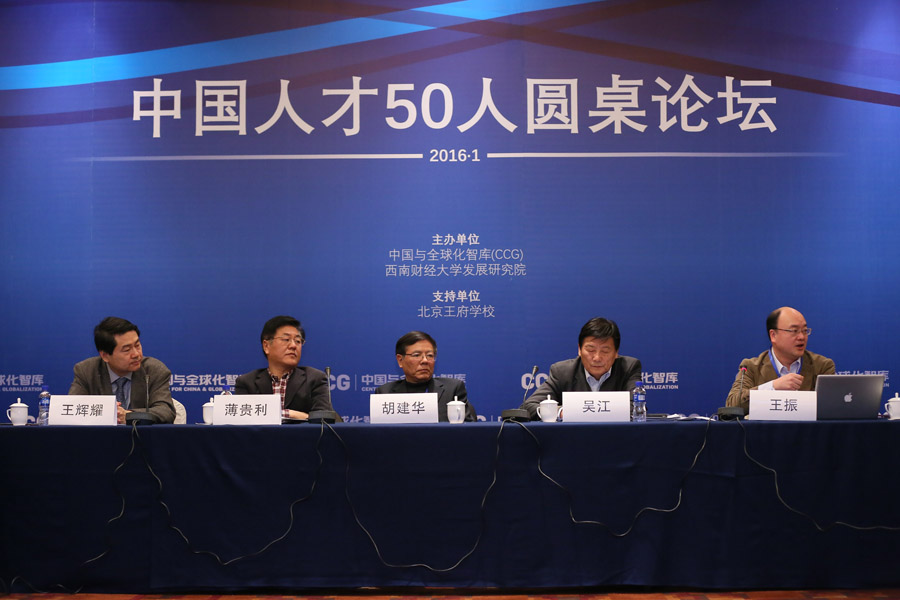
Hosted by CCG President Wang Huiyao, the first session was focused on “The 13th Five-Year plan and Implementation of Strategy with Talent Development as a Priority”. The speakers discussed the opportunities and challenges for talent development in the new era and exchanged their ideas about the key issues in China’s national talent development strategy. They highlighted the need to improve the quality and efficiency of talent development work to provide a favorable environment and effective support for the strategy. The speakers included:
•Wu Jiang, Executive Vice President, China Talent Research Institute
•Hu Jianhua, former Deputy Inspector, Bureau of Talent Development, Organization Department of the CPC Central Committee
•Wang Zhen, Vice President, Shanghai Social Science Academy
•Bo Guili, Director, Strategy Research Center, National School of Administration
•Lin Zeyan, Director, Office of Research, All-China Federation of Industry & Commerce
•Zheng Qixu, former Secretary of CPC Committee, China University of Petroleum
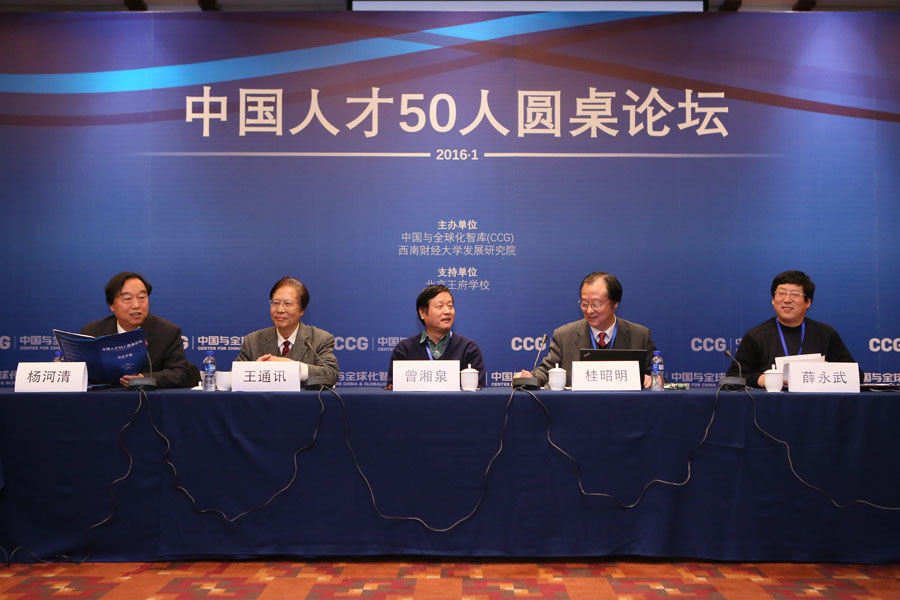
The second session, “Accelerate Talent Development System Reform and Policy Innovation”, looked into key issues, such as the path, challenges, and solution for talent development system reform and innovation. Participants in the discussion included:
•Wang Tongxun, Director, Academic Committee, China Talent Research Institute
•Zeng Xiangquan, former President, School of Labor and Human Resources, Renmin University
•Gui Zhaoming, former Vice President, Wuhan Institute of Technology
•Xue Yongwu, Director, Center for Cadre and Talent Research, Ocean University of China
•Ma Kangmei, former Vice President, China University of Political science and Law
•Zhong Zurong, Vice President, Beijing Institute of Education
•Chen Xinhua, President, Stateoil China
The speakers agreed that talent development system reform will be taking place in the era of big data, intellectualization, and cloud data. They also all believed that the realization of such a background is crucial to the implementation and evaluation of an effective talent development strategy.
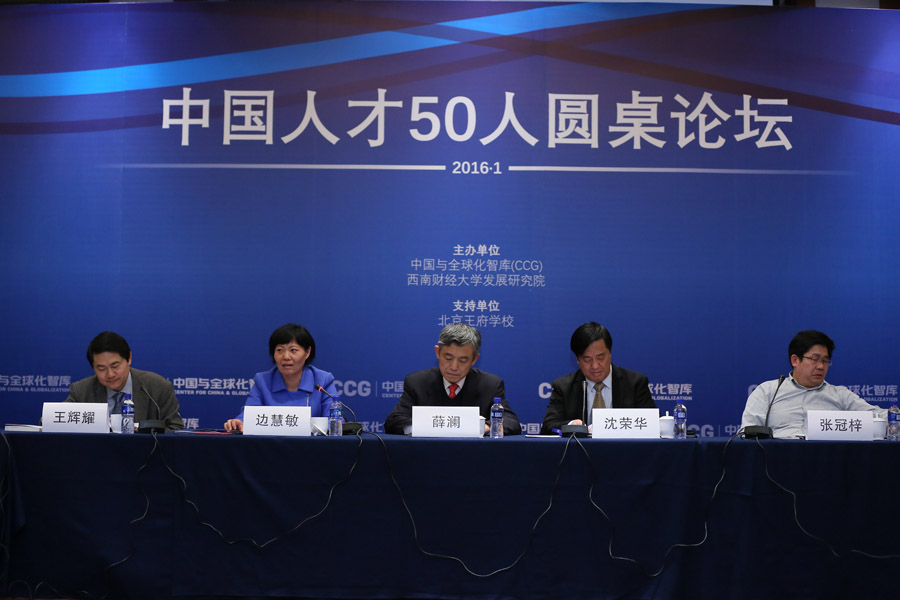
The Session Three, focused on “”How to Establish Internationally Competitive Talent System” and discussed how to innovate talent recruitment strategy in the era of globalization to improve international competitiveness of China’s talent development system. The speakers pointed that a precondition for successful talent development work is giving talented people the respect they deserve. It is crucial to use right kind of thinking and establish a reasonable evaluation structure to determine the value of talent. The speakers included:
•Bian Huimin, Secretary of CPC, Xihua University
•Xue Lan, President, School of Public Administration and Policy, Tsinghua University
•Shen Ronghua, Honorable Director, Shanghai Public Administration and Human Resources Research Institute
•Zhang Guanzi, Director, Department of Human Resources and Education, China Academy of Social Studies
•Yang Hongying, Director, Office of Human Resources, Beijing Normal University
•Yang Heqing, former President, School of Labor Economics, Capital University of Economics and Business
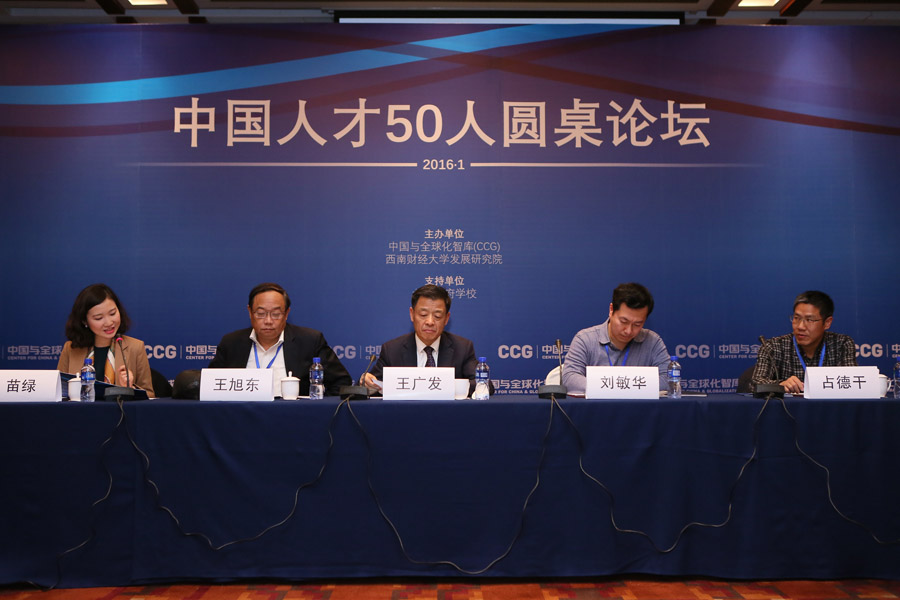
The last session, hosted by CCG’s Secretary General Mabel Miao Lu, was focused on “Attracting Talent to Promote Mass Entrepreneurship and Innovation”. The participants discussed how to follow the guidance of mass entrepreneurship and innovation to create more room for talent development and provide new impetus for economic growth. They believe that entrepreneurship and innovation are caused by many factors, such as the overall business and economic environment, policy mechanisms, and human resources. Above all, talent discovery and cultivation is a key to the success. The speakers at this session include:
•Wang Guangfa, President of Fazheng Group
•Wang Xudong, former General Manager, China International Intellectech Corporation
•Liu Minhua, Director, Department of Talent Development Work, Organization Department of CPC Committee, Beijing Municipal Government
•Zhan Degan, Director, Talent Research Institute, China National Petroleum Corporation
•Yu Bingbo, Chief, Bureau of Foreign Expert Affairs, Qiangdao Municipal Government, Shangdong Province
•Jia Zhongjie, Vice President, China Association for Continuing Education
•Chen Shunjiao, Director, Talent Affairs Office, Dongguan city government
•Li Weifeng, Associate Professor, Institute of Development Studies in the Southwest University of Finance and Economics
“China Talent 50” Roundtable Forum will become a regular event dedicated to the study of talent development strategy and focused on the key issues and challenges of China’s talent system reform. It is aimed at building connections between academic, business and public policy-making community. Every forum will invite about 50 participants from research institutes, government agencies and companies to provide their insights and recommendation regarding how to improve talent development strategy and establish talent study theories.
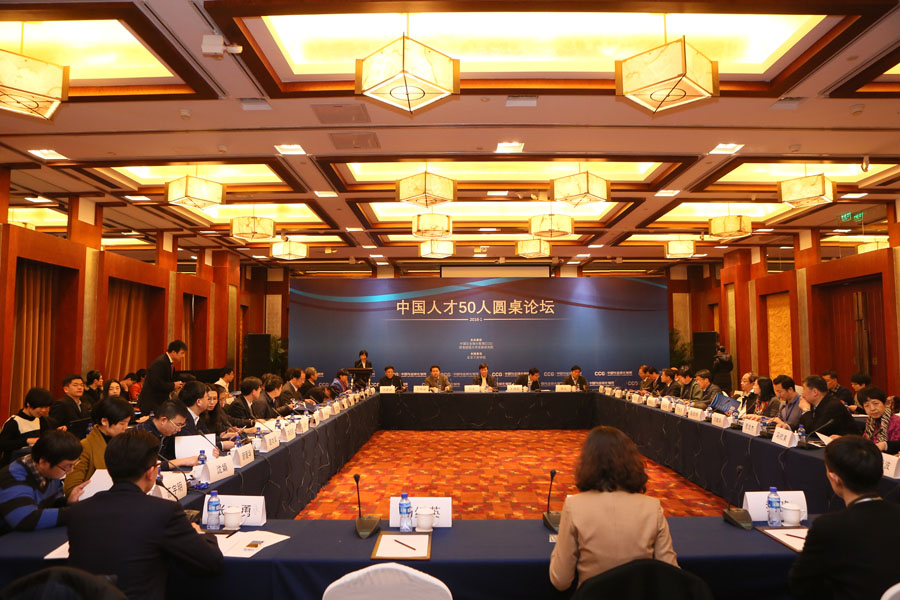
In addition, this forum also attracted government officials for talent development work from Beijing, Shanghai, Tianjin, Hebei, Sichuan, Qingdao, Dongguan, and Ningbo, as well as a number of reporters from mainstream media outlets such as Xinhua News Agency, China News Agency, China Youth Newspaper, China Radio International, People’s Daily, Sina.com, and Guangdong Satellite TV. In particular, Zhang Baozhong, President of China Organization and Human Resources Newspaper, attended the forum.
CCG is a China-based international think tank with strong expertise in talent study. It has been approved to host a postgraduate education station and selected by the Central Personnel Work Coordination Group of CPC’s Central Committee to host a base for talent theory study. Since its establishment in 2008, CCG has conducted a number of academic studies commissioned by Chinese government agencies including CCCPC’s Organization Department and United Front Work Department, Ministry of Human Resources and Social Security, State Council’s Overseas Chinese Affairs Office and State Administration of Foreign Experts Affairs. CCG has participated in the feasibility study for the National Plan for Mid and Long- term Development 2010-2020, and published talent study reports on Chinese studying abroad, overseas Chinese returnees, Chinese migrating abroad and China’s regional talent development. CCG has been also steering the study for the newly-released 20 immigration policies by Beijing Municipal Government to support its innovation and development.

